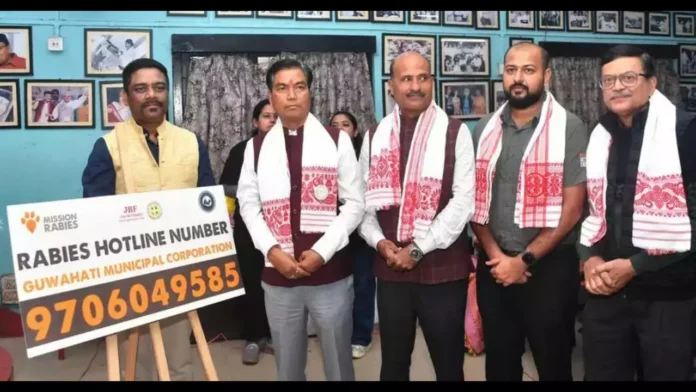Assam has taken a noteworthy step towards combating the growing public health concern of rabies by officially launching the Assam Rabies Elimination Project. This joint initiative, aimed at eliminating rabies in the state, was unveiled on Wednesday at the Gauhati Press Club. The project is a collaboration between Mission Rabies WVS, Just Be Friendly (JBF), and is supported by the Department of Animal Husbandry and Veterinary, Assam, and the Guwahati Municipal Corporation (GMC).
The launch event was graced by several prominent figures, including Mrigen Sarania, Mayor of GMC, Dr. Dandeswar Deka, a member of the Veterinary Council of India, Moloy Baruah, a noted environmentalist, Dr. Sashanka Sekhar Dutta, the Founder and Managing Trustee of JBF, and Dr. Balaji Chandrashekar, Director of Operations for Mission Rabies India. The project’s unveiling comes at a time when the state is grappling with rising cases of rabies, primarily transmitted through dog bites.
Highlighting the Need for Action
During the launch, Moloy Baruah emphasized the critical importance of rabies control. He highlighted the dire need to curb the disease’s spread and the substantial impact that rabies has on public health, particularly in rural areas where dog bite incidents are more prevalent. Baruah noted that rabies is preventable, yet it remains one of the most significant causes of death in the state due to inadequate awareness and vaccination programs.
Dr. Deka also echoed the sentiment, stressing that rabies is a disease that directly links human, animal, and environmental health. He called for coordinated efforts among the government, local bodies, and non-governmental organizations to effectively combat the disease. The Guwahati Municipal Corporation has taken this as an opportunity to further strengthen its rabies control programs by launching a dedicated rabies hotline.
A Two-Phased Approach
The Assam Rabies Elimination Project is designed with a two-phase strategy. The first phase will focus on the metropolitan area of Guwahati, the state’s largest city, aiming to vaccinate at least 70% of the dog population. The project will include mass vaccination drives, which will be an essential part of achieving the goal. Additionally, the project will focus on enhanced rabies surveillance through Integrated Bite Case Management (IBCM), which will allow health workers to monitor and manage dog bite cases more effectively.
Public awareness will also be a critical component of the first phase. Programs targeting schools, hospitals, and public spaces will be organized to educate the population about rabies prevention, vaccination, and the importance of early medical intervention after a bite. The goal is to spread awareness about how rabies is contracted, the need for rabies vaccinations for pets, and the immediate steps to take if someone is bitten by a dog.
The second phase of the project will extend to three model districts in Assam. These districts will serve as a testing ground for broader strategies aimed at rabies elimination, such as improving coordination between veterinary and public health departments. The success in these areas will serve as a model for other regions across the state.
Rabies Hotline for Public Assistance
A vital feature of the Assam Rabies Elimination Project is the launch of the rabies hotline, which is now active at the number 9706049585. This hotline has been set up to help the public report suspected rabies cases, which can then be addressed swiftly by the authorities. The hotline provides a direct link to local veterinary and health departments, ensuring that rabies-related incidents are dealt with in a timely and efficient manner. The availability of this hotline is a critical step towards improving response times and reducing the risk of rabies-related deaths.
Successful Models and Collaborative Efforts
Mission Rabies, a global initiative by Worldwide Veterinary Service (WVS), has implemented successful rabies control programs in several Indian states, including Goa, Tamil Nadu, and Karnataka. The organization has years of experience working in the rabies control space and has helped reduce rabies cases significantly in the states where it operates. The knowledge and expertise of Mission Rabies are expected to play a crucial role in the successful implementation of the Assam Rabies Elimination Project.
By focusing on mass vaccination, surveillance, and public education, the project is expected to majorly reduce the rabies burden in Assam and improve the overall public health scenario. It is hoped that these efforts will not only lead to the elimination of rabies in the state but also raise awareness on the importance of animal vaccinations in controlling zoonotic diseases.
The Assam Rabies Elimination Project represents a landmark initiative in the state’s efforts to address public health challenges. Through a combination of vaccinations, public awareness campaigns, and improved healthcare infrastructure, the project aims to eliminate rabies and prevent its transmission to humans and animals alike. With the support of local government bodies, non-governmental organizations, and the public, this ambitious project is well-positioned to achieve its objectives, bringing Assam closer to a rabies-free future. The initiative is not only a step forward in tackling a growing health issue but also a symbol of Assam’s commitment to improving the quality of life for its residents by addressing pressing health concerns.


